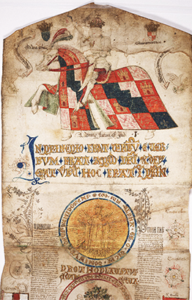American Branch Gives Grant Money for Innovative Edward IV Roll Project
The Richard III Society-American Branch is pleased to announce that it has provided $3,000 in funding to four scholars at the University of Pennsylvania for the first phase of a multi-phase project to transcribe, translate, and digitally map the text of Free Library of Philadelphia Lewis MS E201, a 19-foot propaganda genealogy of Edward IV lavishly illustrated with portraits, roundels, heraldic banners, and the iconography of the principal lines of Yorkist descent. Rolls such as E201 were a critical part of the Wars of the Roses as they were created to justify a hereditary claim to the English throne, and Richard III surely would have been aware of them.
This project is a continuation of the work on this manuscript funded by the Branch in the late 1990s to conserve and prepare it for display at a 2001 exhibition, “Leaves of Gold: Treasures of Manuscript Illumination from Philadelphia Libraries.” The Branch has a long history of supporting preservation and access to Edward IV Rolls held in the USA. Read much more about it here.
 Because E201 is unique among the many propaganda genealogies of the Wars of the Roses for its wealth of iconography and its unconventional presentation, it can provide insights on how the Yorkist faction wished to present the validity of its claim to the throne and its marshaling of documentary (and mythological) evidence to support it. It can also shed new light on the networks of support, real or imagined, for the Yorkist cause. The project will be of considerable scholarly importance and can spark additional research, while at the same time making the document accessible and intelligible to the layperson as it will offer an English translation of its abbreviated Medieval Latin calligraphy.
Because E201 is unique among the many propaganda genealogies of the Wars of the Roses for its wealth of iconography and its unconventional presentation, it can provide insights on how the Yorkist faction wished to present the validity of its claim to the throne and its marshaling of documentary (and mythological) evidence to support it. It can also shed new light on the networks of support, real or imagined, for the Yorkist cause. The project will be of considerable scholarly importance and can spark additional research, while at the same time making the document accessible and intelligible to the layperson as it will offer an English translation of its abbreviated Medieval Latin calligraphy.
Using the Digital Mappa software, the top part of E201 will be divided into sections highlighting its major components and allowing users to access links to background information or to similar manuscripts. Excitingly, this will enable anyone to compare this roll to other medieval rolls, as well as to learn more about the people, the images, and the text in it.
The initial phase of the work will be supervised by Dr. Emily Steiner, Professor of English at Penn. She is the author of three books, Documentary Culture and the Making of Medieval English Literature (Cambridge University Press, 2003), Reading ‘Piers Plowman’ (Cambridge University Press, 2013), and John Trevisa’s Information Age: Knowledge and the Pursuit of Literature, c.1400 (Oxford University Press, 2021). She is a trustee of the New Chaucer Society and Director of the International Piers Plowman Society. Her teaching interests include Old English literature, Chaucer, Arthurian literature, and poetry of all periods.
The work of transcribing and translating the manuscript will be carried out by three Penn graduate students: Ariel Bates, a second-year PhD student in English specializing in medieval and early modern literature; Emma Dyson, a doctoral candidate in Classical Studies with an interest in Latin literature from antiquity through the Renaissance; and Noa Nikolsky, a doctoral candidate in English who studies medieval literature and its intersections with medieval medicine, psychology and self-help culture. Their work will be performed in the Summer of 2023.
The digital mapping work will be performed by Dot Porter, Curator of Digital Research Services at Penn. As Curator in the Schoenberg Institute for Manuscript Studies at Penn, Dot Porter participates in a wide-ranging digital humanities research and development team within the context of a special collections department. Dot’s projects focus on the digitization and visualization of medieval manuscripts. Dot will be assisted by volunteers from the American Branch, including its former board member Laura Blanchard.
The mission of the American Branch of the Richard III Society is to bring forward a historically-accurate, balanced, and fair assessment of a controversial English king, and to support educational initiatives to interpret his times. The Branch connects Americans with the global Ricardian community through joint membership with the Richard III Society in the UK, and with one another by organizing events and supporting research that deepen our knowledge of medieval history.


